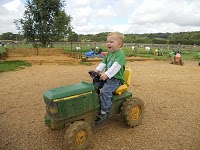I am a science teacher by trade but I am currently having a career break as a mummy, as I had three babies in 15 months who are now two and a half and eighteen months!Now, I am not your stereotypical scientist; male, white hair and a beard, slightly crazy, glasses and old! Well, slightly crazy maybe, but I like to call myself geek chic! A geeky Mum with a love of science and lip gloss!Most people are under the misconception that science is hard or boring. It isn’t, it is everywhere and amazing, and underpins almost everything we do. When you have a young family science does not seem to be on the list of priorities over feeding, potty training and the reminding of please and thank you, but I truly feel it is important to start ensuring your little one, however little, becomes aware of science, without them even realising it by learning through play. You do not need any qualifications; you just need to think about developing a child with an enquiring mind. Under five, children are at their most curious and inquisitive, wanting to explore and experiment. They are prepared to take risks as they have limited fear, so it is the perfect time to focus these qualities towards science. Our country is currently so short of scientists, so how can we encourage and engage children in the concepts of how things work and why – well that’s easy, through play!
1. At Bath time!
This is an excellent place to introduce lots of new concepts.• We all remember the days of pretending to make potions! Mixing and combining bath products (obviously under supervision and not cleaning products). Getting your toddler to mix bubbles with water, stir and pretend with get them thinking like Harry Potter, but you are already encouraging the idea of chemistry!• It is also a perfect place to demonstrate floating and sinking – you don’t have to get density just get them to think about why something might float or sink? Is it bigger or heavier?
You can also demonstrate flow, pouring, measuring and the turning of water wheels (which later at GCSE then can lead onto generating electricity). These are all good tools to introduce at bath time, developing science skills as well as concepts.
Plus it is all through play!
This is chemistry in its most basic form. Adding ingredients to see reactions and to make something else!
Making bread – if you make bread, you add yeast (a living organism) to make it rise. This occurs because the yeast respires and makes carbon dioxide gas and that is what makes the bread rise – the filling up of gas! This is a great way to get your little ones to ask how and why? It doesn’t matter at this stage if they just think it is filling with air, or if in fact they just think it is cool!• Putting lemon juice in a cup and adding bi-carbonate of soda – a demonstration of a very simple reaction. It will fizz and bubble over and look quite cool!• Introducing the ideas of change of state. Anything that melts or defrosts is showing a change of state, from solid to liquid, and steam from the kettle is liquid to gas and freezing is liquid to solid! All easy to show or just even mention in the kitchen!And they think its play!
Nature trails – looking for tracks, seeing what is growing, animals and plants and food chains (what eats what) are all introducing the ideas of biology.
You can collect bugs and creepy crawlies to look at in a tray – try to put some of their natural earth and leave in with them, and only look at them for a short while before putting them back, but you can count legs and body segments and name them. This also gives children a respect for living things.• Trips to the zoo and farm parks are all ways in which you expose your little ones to science without even realising it
• You can talk about the car going fast and slow and introduce the concept of speed whilst spotting tractors and diggers and buses and seeing if they are going fast or slow. This is bringing in an element of physics and again they think your playing!
As far as my son is concerned if it involves cars and diggers, then it most definitely must be play!
5. At night
• The night sky – introduce the stars and the moon, to start talking about space. You can play and make rockets and talk about the idea of aliens!• Looking at nocturnal (night) animals. You can listen for owls, and talk about badgers and foxes for example.So you see it is happening all the time and is so easy to include in everyday play activities!
My two year already got his first lesson learned in gravity when he attempted to climb out of his cot! (I did however cuddle him and not launch into gravity laws at that point!) As he said, ‘Mummy, we all fall down!’ He is right! So that is all there is to it, getting them to question why and encouraging them to explore and seek. You never know, we could have lots of Darwin’s, Hawkins’s and Einstein’s on our hands in twenty years time!
Posted by Kerry
Last Updated on March 2, 2013 by Emma Vanstone




You’re right, it is so easy to find ways in which to guide their scientific development through play. I am a massive advocate of learning through play, excellent suggestions above.